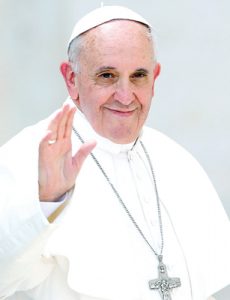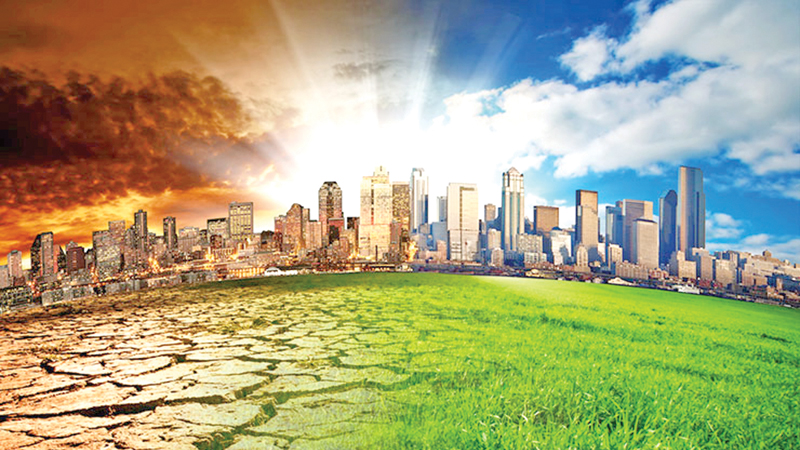His Holiness Pope Francis has issued his second document on the Climate Crisis under a Christian title “Praise God”, dated October 4 addressed to all men of goodwill, the first being the encyclical Laudato Si issued in May 2015 on our duty to care for the earth, our common home. Turning once again conscience into action for a thriving Earth, the present document echoes a more ardent and passionate appeal to take seriously the issue of climate change the signs and repercussions of which are being felt so clearly for the past two decades destructively affecting the earth, out common home and conversely, to face the task of caring for the environment that will preserve the endowments of the world of nature which is so much a part of our lives.
He warns about very serious consequences that will follow if this grave concern is not given priority attention. Climate change has become a global issue affecting the whole of the world’s six billion people from the ice-glaciered North Pole to the tip of South Africa as well as from Europe across the Middle-East, through Asia and the Americas. The crisis is taking on a dangerous turn which will spell utter disaster for the entire planet and for humanity too as such, who will eventually become helpless victims of environmental catastrophes and poisoning of the earth’s surface.
A global crisis
 With Pope Francis’s document,the physical and cosmic phenomenon of climate change has transcended from being a mere economic, scientific and mini-technological issue to become a moral issue that demands an ethical response. Political leaders of nations across the world bear a heavy responsibility in looking for solutions to this global problem. The pollution of the environment that has resulted in many a natural disaster such as the melting of ice-glaziers in the north pole, global warming with the rising temperature of the sea-levels, the loss of rain-forests, floods and droughts is now identified as a structural evil or sin of which all of us who wound nature are guilty.
With Pope Francis’s document,the physical and cosmic phenomenon of climate change has transcended from being a mere economic, scientific and mini-technological issue to become a moral issue that demands an ethical response. Political leaders of nations across the world bear a heavy responsibility in looking for solutions to this global problem. The pollution of the environment that has resulted in many a natural disaster such as the melting of ice-glaziers in the north pole, global warming with the rising temperature of the sea-levels, the loss of rain-forests, floods and droughts is now identified as a structural evil or sin of which all of us who wound nature are guilty.
Hence this global evil has to be countered with a well-planned response that will repair the damage already incurred as well as prevent any future disaster that might overtake us. In a documents that has 73 paragraphs, the Pope places this topic in the context of the signs of impending danger to our planet as a result of the callous indifference that powers that be are showing towards the climate change questions and the immediate steps to be taken to avert climatecrisis becoming worse and if delayed having to contend with greatly regrettable consequences.
The document has six major sections in which the first offers a graphic picture of the catastrophe at hand and alerts us to its seriousness with its urgency of an effective and global response. It is not an intermittent or sporadic happening but there is a constant imbalance that seem to be causing all the natural disasters such as global warming, fires, droughts and floods, the dried-up lakes and communities swept away by tsunamis. One cannot blame the increase of population or the world’s poor for the pollution of the surroundings.
It is clear that the main cause for climate change is the use of fossil fuels, resultant gas-emissions and scant effort made to look for alternative cleaner energy sources putting politicians and business leaders under obligation to adapt to this course of action. The Pope is more than convinced of the human (anthropic) cause of this tragedy made worse by the industrial revolution which accelerated the greenhouse gas emissions during the mid-19th century. The correlation between this acceleration and the global climate phenomena has been confirmed by a majority of scientists. The document insists that “we can no longer doubt that the reason for the unusual rapidity of these dangerous changes is a fact that cannot be concealed: the enormous novelties that have to do with unchecked human intervention on nature in the past two centuries”.
Technocratic paradigm is insufficient
The Pope warns that one has to be cautioned and have reservations about the current “technocratic paradigm” underlying the current process of environmental decay. “Artificial intelligence and the latest technological innovations start with the notion of a human being with no limits, whose abilities and possibilities can be infinitely expanded thanks to technology. In this way, the technocratic paradigm monstrously feeds upon itself”. Reacting and taking a contrary position the Pope says that contrary to this technocratic paradigm, we must say that the world that surrounds us is not an object of exploitation, unbridled use and unlimited ambition.
Nor can one claim that nature is a mere “setting” in which we develop our lives and our projects. For we are part of nature, included in it and thus in constant interaction with it and thus we do not look at the world from without but from within. According to him, this view demands a healthy ecology that will check on the use of human power in the hands of people. The ethical decadence in this situation has to do not only with physics or biology, but also with the economy and the way we conceive it.
The mentality of maximum gain at minimal cost, disguised in terms of reasonableness, progress and illusory promises, the document says, makes impossible any sincere concern for our common home and any real preoccupation about assisting the poor and the needy discarded by our society.
Great obstacle
A great obstacle to remedying the deplorable climate crisis is the weakness of international politics and the twisted understanding of the so-called “multi-lateralism” in international relations and collaboration. In a sweeping analysis, the Pope remarks that, our world has become so multi-polar and at the same time so complex that a different framework for effective cooperation is required. It is not enough to think only of balances of power but also of the need to provide a response to new problems and to react with global mechanisms to the environmental, public health, cultural and social challenges, especially in order to consolidate respect for the most elementary human rights, social rights and the protection of our common home.
It is a matter of establishing global and effective rules that can permit a “providing for” this global safeguarding. The urgency is being underlined that there is a desperate in need of a model of multi-lateral diplomacy capable of responding to the new configuration of the world.Over the past decades, there have been a host of conferences with representatives from over 190 countries meeting practically annually, with climate and ecological crisis as their sole agenda, beginning from the 1992 Rio de Janeiro conference adopting the United Nations Framework Convention on Climate Change (UNFCC) up to the 2022 meeting in Sharm ElSheik (Egypt), 26 meetings in all including Paris-2015, Madrid-2019, Glasgow- 2021,with the next scheduled in Dubai for Nov/Dec 2023.
They have passed resolutions to minimise sources of gas-emissions, look for alternative energy resources and compensation to be paid by countries to those who have been vulnerable and affected by the climate change and its accompanying adverse effects. It is, however, a matter of regret it is observed, that the over-all impact of these meetings have not fully achieved their goals.
Future hope of better strategies
Pope Frances looks forward to the Dubai meeting hoping it will push for a decisive acceleration of energy transition, with effective commitments subject to ongoing monitoring. This conference can represent a change of direction, showing that everything done since 1992 was in fact serious and worth the effort, or else it will be a great disappointment and jeopardise whatever good has been achieved thus far.The transition towards clean energy sources such as wind and solar energy, and the abandonment of fossil fuels, is not progressing at the necessary speed. We risk in the mindset of pasting and papering over cracks, while beneath the surface there is a continuing deterioration to which we continue to contribute. To suppose that all problems in the future will be able to be solved by new technical interventions is a form of homicidal pragmatism, like pushing a snowball down a hill.
The Pope calls for a sincere interest in making the Dubai meeting a historic event that honours and ennobles us as human beings, then one can only hope for binding forms of energy transition that meet three conditions: that they be efficient, obligatory and readily monitored. It is imperative that a new process that is drastic, intense should be launched counting on the commitment of all. That is not what has happened so far, and only a process of this sort can enable international politics to recover its credibility, since only in this concrete manner will it be possible to reduce significantly carbon dioxide levels and to prevent even greater evils over time. Pope Francis appeals ardently to the powerful to stay with the nobility of politics and be remembered as those who wielded praiseworthy leadership when it was most needed.
Second exhortation
This second exhortation on the Climate crisis ends with a reference to the spiritual motivations needed to enthuse and engage us at this crucial hour which spells serious danger to our common home but also ignites hope for a renewed and committed interest in ensuring a pollution-less clean environment for the future. While addressing himself to the Catholic faithful to act out of their Christian faith he also invites people of all other religions to do the same, since “authentic faith not only gives strength to the human heart, but also transforms life, transfigures our goals and sheds light on our relationship to others and with creation as a whole”.
Making many Bible-references, the Pope shows why we should keep the beauty of creation which is the handy-work of God and is a manifestation of His glory and our obligation to keep it that way. Finally, he invites everyone to accompanythis pilgrimage of reconciliation with the world that is our home and to help make it more beautiful, because that commitment has to do with our personal dignity and the highest values. It is evident that effective solutions will not come from personal, family and community efforts alone which by the way are showing signs of change in their life-styles which can help, but above all from major political decisions on the national and international level. He leaves a profound insight for everyone’s reflection with the words: “When human beings claim to take God’s place, they become their own worst enemies”.









